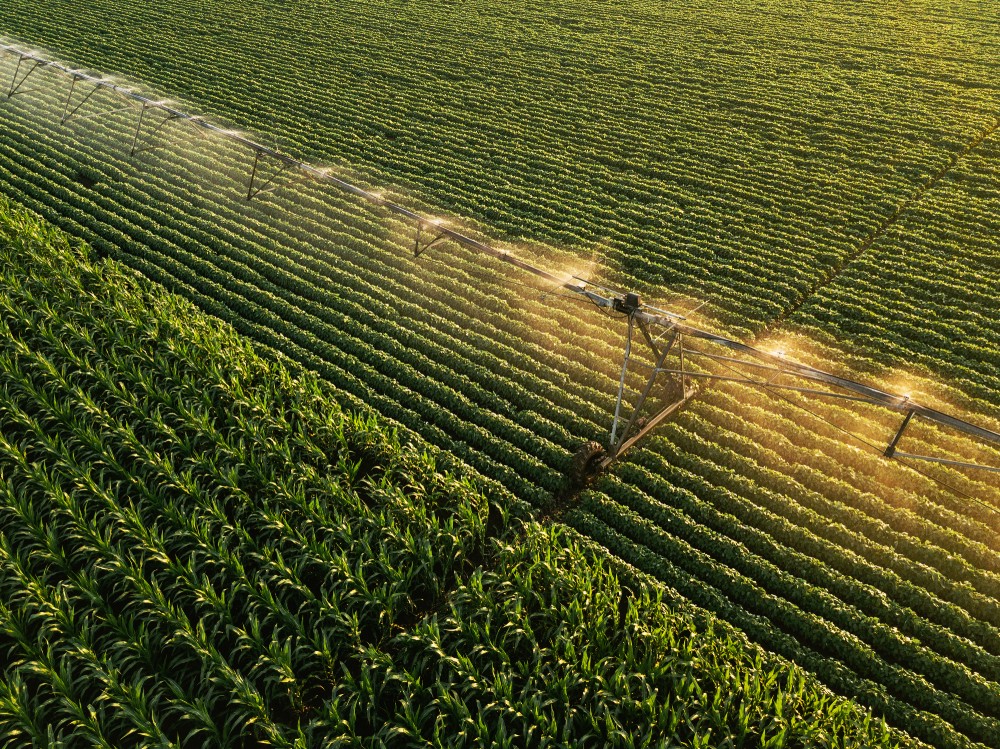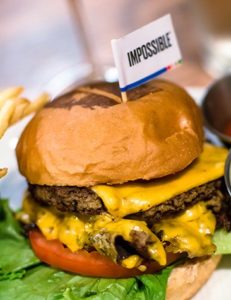Medium.com: Impossible Foods, Impossible Claims
by Anna Lappé | July 22, 2019
The company has courted ethical foodies, but how sustainable is this meat alternative?
Impossible Foods — maker of the veggie “burger that bleeds” — is the latest darling of the food-tech world. Its stardom is driven largely by its claims that the burger is better for the planet than the real thing: But what’s actually in its signature patty raises big questions. Despite these questions, Forbes has given it glowing coverage; The New York Times has served up front-page column inches. Katy Perry, Questlove, and Jay-Z are all investors. And the company is already shorthand for a dot-com wunderkind. At a recent tech conference I attended more than one pitch led with “We are the Impossible Foods of…” This status comes from a PR arsenal, of course, a novel product, yes, but also from the company’s explicit courtship of the ethical foodie, tapping a new generation of eaters who want to ensure the food on their plate helps the planet. In its very mission statement, Impossible Foods claims it will “drastically reduce humanity’s destructive impact on the global environment” by using plant-based proteins. But just because it’s not meat, doesn’t mean it’s a planetary panacea.
To be clear, I’m all for Impossible Foods top execs calling out the environmental impacts of industrial livestock production. My mother, Frances Moore Lappé has been ringing these alarm bells for nearly fifty years, starting with her 1971 Diet for a Small Planet. And ten years ago, I wrote a book about the food sector’s impact on climate change and the significant role of industrial livestock. But while others have raised health concerns over Impossible Foods’ genetically engineered heme protein or environmental concerns over its energy-saving estimates, I’m alarmed about the company going all in on genetically engineered soy. Impossible Foods CEO claims its sourcing of genetically engineered soy is a reflection of the company’s “commitment to consumers and our planet,” but the troubling track record of just such soy is at odds with that commitment.
This is no small quibble: This is about fact-checking a company raising millions of investor dollars on its eco-claims, but ultimately, this is about being clear about what food we should be producing, and eating, to the save the planet.
New evidence is revealing we are teetering on the edge of an era of massive extinction, propelled in large part by the very pesticides and practices used with genetically engineered crops like that soy destined for Impossible Burgers. In a groundbreaking new study, researchers estimate that 40 percent of insect species face extinction — and we could be looking down the barrel of total insect population collapse by century’s end, primarily as the result of the agricultural pesticides and mega-monocultures of industrial agriculture. Designed specifically for intensive chemical use, genetically engineered crops are key drivers of this impact.
The introduction of genetically engineered crops has led to a massive increase in the use of pesticides globally. Planted for the first time in the mid-1990s, nearly all of these crops to date have been engineered to either express an insecticide, resist an herbicide, or both. Today, 94 percent of soy is genetically engineered, mostly to be resistant to Monsanto’s glyphosate-based herbicide Roundup. Prior to the introduction of these “Roundup-Ready” crops, farmers had to be judicious about using weed-killer; but Roundup-resistant crops meant farmers could spray more and more often — and they did. From 1990 to 2014, the amount of glyphosate, the active ingredient in Roundup, jumped from 7.7 million pounds to 250 million — a 1,347 percent increase with most of that used on genetically engineered crops like the soy in those Impossible Foods burgers. Today, glyphosate is the most widely used herbicide in the world.
There is mounting evidence about the ecological impact of this boom. In China, researchers found that glyphosate exposure led to honeybee larvae deaths. In the United States, studies have connected Monarch butterfly decline with glyphosate use, particularly as milkweed on which the butterfly depends has been decimated. Another study found Roundup use resulted in a 70 percent decline in the “species richness of tadpoles.” And yet another found that the herbicide adversely affects “soil and intestinal microflora and plant disease resistance” and is “toxic to a range of aquatic organisms.”
Then, there’s the human health impacts of the pesticides used on genetically engineered soy, specifically glyphosate-based weed-killers. In 2015, the World Health Organization’s cancer research agency issued a declaration based on a review of peer-reviewed literature that glyphosate was a probable cause of cancer. Just last month, a California jury awarded $2 billion in punitive damages and economic losses to a California couple suffering from non-Hodgkin lymphoma who had used glyphosate-based herbicides for decades. It was the third legal loss for Bayer, which recently purchased Monsanto, the world’s largest producer of Roundup. More than 13,000 cases are pending.
Growing genetically engineered crops, and the agrochemicals used in concert with them, affects more than just those handling pesticides. We’ve seen this on the Hawaiian island of Kauai`i, for example, which is ground zero for the development and testing of genetically engineered seeds. There, the fields abut schools, hospitals, and neighborhoods in communities that have seen spikes of asthma, cancers, and birth defects linked to drift and runoff from pesticides.
Impossible Foods’ embrace of genetically engineered soy comes at the same time a new wave of these crops enters the market, posing a new set of risks. As weed resistance to glyphosate has grown — now with more than 40 glyphosate-resistant weed species and counting — companies have been genetically engineering soy to resist other herbicides like dicamba and 2,4-D, chemicals with long track records of toxicity and ecosystem concerns. Many farmers across the Midwest have already been devastated by crop failure as a direct result of drift from these pesticides.
Consumers are increasingly seeking “health and wellness claims,” twenty percent more than in 2016, found a recent poll by L.E.K. Consulting. These conscientious consumers are driving the boom in plant-based alternatives to meat and dairy and products raised without toxic chemicals. Impossible Foods’ spin is trying to tap this planet-friendly public sentiment, but its commitment to genetically engineered soy belies a growing body of evidence that these crops are harming, not helping, the planet. In an era of a climate emergency and biodiversity crisis, we need to be working, with ever greater urgency, to eliminate our dependence on toxic pesticides — not doubling down on it.




